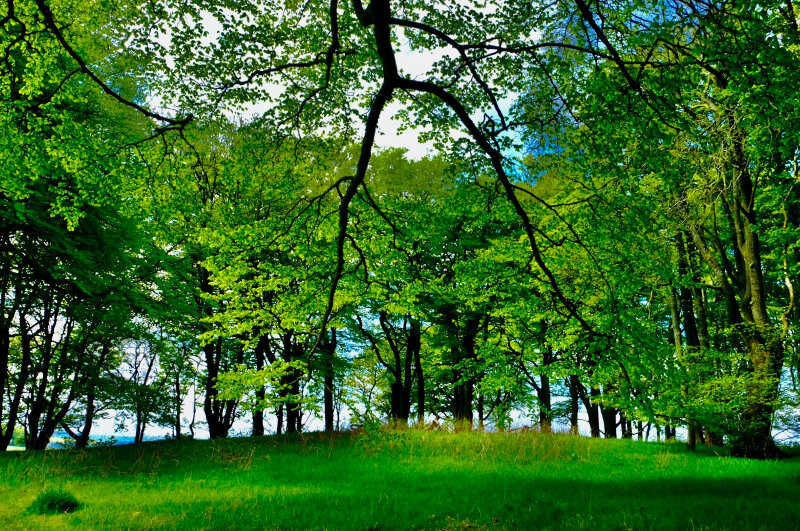A Return to Den Wood
/A companion piece to Winter in Den Wood, published here on Elsewhere in January 2021.
By Ian Grosz:
For me, trees have always been the most penetrating preachers – Herman Hesse
In late May I returned to Den Wood. I had last been here in the winter when the trees had been bare and seemingly lifeless. The small tunnel of twisted, comingling branches at the entrance to the wood was now almost a full leafy canopy, but it had been a cold and wet May, and the wood was late in its blooming; the ferns not yet unfurled and many buds yet unbudded; the growth of the wood almost a month behind its usual blossoming. The gorse was in full flower though, and there was a greater variety of birdlife amongst the trees: bluetits and yellow hammers; finches and robins as well as the ground birds I’d seen before: the blackbirds and thrushes. The lower sections of the wood were full with song and I felt my mind begin to slow with each step, the earthiness of the air in my lungs as I walked in the marbled light of the first warm days we’d seen since the onset of spring.
I had felt tense when I arrived. Both my wife and I had been bad tempered that morning, and I was still carrying the frustration and mild anger of our irritability. We’d been locked down together in our small home since I had lost my job the year before. We all need our own space from time-to-time, especially when under the added strain of uncertainty. Arriving at the woods, that space for me immediately opened up, but it can still be difficult to let go of our often, self-imposed time constraints; let life flow a little more freely. I walked too quickly along the path, headed for the grove of wych elms I’d last seen bare and ghoulish in the winter; headed single-mindedly to my intended destination with my camera as though I had some urgent appointment. I crossed the low bridge above the stream and forced myself to pause there, letting the trickling sounds of its meditative flow settle me a moment.
I’d been diagnosed with anxiety disorder the previous summer, and I had become more aware of its insidious nature; the way it can overtake me without my realising it; make me feel as though everything is urgent; everything time-critical and to be done quickly. As a pilot, a sense of time pressure and sometimes urgency had been an occupational hazard that had crept into the rest of my life, invading everything I did with its insistency. It had become so great I couldn’t go shopping or load the dishwasher without my chest tightening and my pulse quickening. Everything I did, I did furiously. Finally, I had developed vertigo, and my flying life was over. Now I needed to force myself to slow down; to let life flow a little just like this stream, and I stood on the bridge and allowed the sounds of the water to fill my consciousness. It did the trick, because I now ambled up to the elms, taking my time and taking photographs along the way, noticing details; letting the green light of the wood bathe me in its soothing balm.
It is now a well-known scientific fact that being amongst trees is good for us. Studies have shown that a walk in the woods reduces levels of cortisol and other harmful hormones in the body; lowers blood pressure and even boosts the body’s immune system through the release of phytoncides in aromatic compounds. A study carried out in Japan in 2016 on elderly patients with Chronic Obstructive Pulmonary Disease, found that ‘forest bathing’ significantly reduced the production of chemicals that add to inflammation and stress. The exact mechanisms at play seem unclear, but perhaps it’s the way we simply slow down when in natural environments; allow our bodies and minds the space they crave.
I had seen the potential for life in the bare elms of the winter; the promise of the spring to come and the message it held for both my own situation and the world in the midst of a pandemic. Now they had made a healing canopy of patchwork green high overhead, the thin trace of blue sky and clouds appearing as though threaded through their branches; earth and sky connected by their reaching presence. I stood beneath them for a long time, just breathing them in, and the stresses in my body, out.
Finally leaving the grove, I sat on a low knoll amongst beech and hazel trees. Self-consciously at first, I closed my eyes to listen to the birdsong; the susurration of the leaves; and to better feel the earth under me. I stopped looking at myself from the outside in, and allowed myself to be. Dare I say it, for a moment perhaps, I felt almost part of things; connected by the trees around me. My heart rate slowed considerably; I know that. For once, I had let go of time; and time it seems, for a moment at least, had let go of me.
***
Ian Grosz is a writer based in Scotland. He draws largely from the landscape for his work and is published across a range of magazines, journals and anthologies both in print and online. He is currently working on a non-fiction book project exploring how landscapes help to shape a sense of place and identity.



